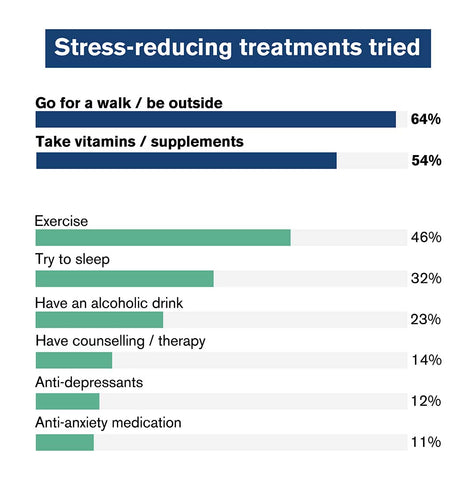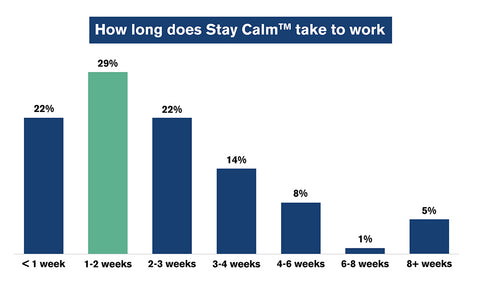Effects of stress & anxiety - latest customer survey

*This article includes data based on a UK survey conducted by DR.VEGAN® of 125 customers, nationally representative, during January 2023. All survey findings reflect our own efforts and have not been influenced or verified by any external organisations or third-party entities.
Stress and anxiety affect all of us - our customer survey of over 12,000 people shows just 4% of people describe themselves as ‘stress-free’. While 48% described their stress as manageable, 48% said their stress levels are ‘high’ or ‘overwhelming’, so we surveyed more than 500 people to understand the impact of stress and anxiety, the symptoms, and methods to overcome stress and anxiety.*
Mental health is a global problem
Anxiety and stress, and their impact on mental health is now a global issue. According to Ipsos Global Health Service Monitor 2022, mental health is now the second biggest health concern (36%), moving ahead of cancer (34%) for the first time, and second only to Coronavirus (47%). Understanding anxiety and stress, and how they affect us, is an important step to addressing our mental health.
How often anxiety affects us
In our customer survey of 545 people, more than 53% said they feel anxious or stressed every day, and 78% experienced stress or anxiety at least once a week.

Anxiety and stress can be triggered by many things, from personal and family relationships to pressures at work, financial reasons, hormone changes and many more factors, and the impact can be exacerbated by poor sleep, poor diet and underlying health issues. You may also enjoy reading the latest customer survey in sleep, the most common sleep problems and their impact.

Common symptoms of stress
Stress affects our mental and physical health. If left unchecked, the physical effects of stress can lead to health problems including high blood pressure, headaches, heart disease, diabetes, weight gain and obesity. The mental health effects of stress are equally dangerous and debilitating, and our customer survey highlights just how common these are. Here are the most common symptoms of stress and anxiety:

Poor sleep and insomnia are the most common symptom of stress, according to our survey, affecting three-quarters of people, and poor sleep is also the most common symptom whether people find their stress manageable or overwhelming.
Stress itself, and when coupled with poor sleep, can exacerbate other symptoms of anxiety including irritability, difficulty concentrating, feeling weak and tired, worsening gut health and depression. Our customer survey of over 700 people into gut health shows 66% of people's gut health worsens when anxious. Learn more about the 6 signs of an unhealthy gut.
Symptoms of stress vary according to the level of stress people feel, according to our survey, which showed that some symptoms become much greater when anxiety is 'overwhelming', including:
- Breathing rapidly
- Uncontrollable worry
- Trembling
- Tightening chest
- Sense of impending danger
- Increased heart rate
If you're regularly experiencing these symptoms on their own or in combination, you should consult your GP or seek specialist help. It is also important to remember that natural changes in hormones through menopause can cause anxiety and mood swings, while mood swings are also the most common symptom of PMS.
Impact of stress on daily life
Stress and anxiety, and the symptoms they present, can be debilitating in our daily life.
Stress and energy
Stress is one of the biggest known causes of chronic fatigue, and our customer survey reinforces this. 80% of those with high or overwhelming stress said they 'regularly' or 'always' lack energy, compared to just 40% among those for whom their stress is manageable.
Stress and social life
The mental health effects of stress have a knock-on effect on our social life and can create a viscous circle of symptoms that can ultimately lead to depression. 75% of people with 'high' or 'overwhelming stress' said they avoid social interaction, compared to only 38% of those with 'manageable stress'. Talking to people, sharing your worries and seeking help, perspective and advice is one of the most helpful ways to manage and overcome anxiety, so if you avoid social interaction when you're anxious, this is only going to worsen symptoms.
Stress and employers
30% of people in our customer survey said they had taken time off work due to stress - this is despite 60% of people saying stress and anxiety cause difficulty in concentrating. 78% of people said employers do not understand or provide sufficient support for employees experiencing stress and anxiety.
Stress and diet
Our nutritionists have written extensively about foods that can help manage anxiety, and tips to boost your energy and reduce stress. These are important because 72% of people said their diet and food choices become less healthy when they're stressed, even though choosing unhealthy foods can worsen symptoms of anxiety and your body's ability to cope with stress.
Addressing stress and anxiety
How people overcome their stress and anxiety varies and will depend on the symptoms and their severity.

The most common method of reducing anxiety, according to our survey, is going for a walk or being outside in fresh air and nature - two-thirds of people reported doing this, and 94% find it effective.
Doing exercise is not only important for our heart health, it is also an effective remedy for overcoming stress and anxiety for 96% of people. A lack of exercise is also one of the most common causes of poor sleep. The customer survey indicated that people who do not exercise are more likely to suffer from poor sleep.
A quarter of people reported reaching for an alcoholic drink when they're stressed, but this is also shown to be the least effective at addressing symptoms, and excessive alcohol consumption can create health conditions. Alcohol can provide a temporary boost to neurotransmitters, however the drop in feel-good chemicals the next day can lead to anxiety and low moods. Alcohol also affects the quality of your sleep and is dehydrating, resulting in fatigue.

While 12% of people reported taking anti-depressants or anti-anxiety medication, more than half of people said they take vitamins and supplements, including Stay Calm®, the formula for bringing natural calm, balance, energy and focus.
In our survey, when asked 'How effective would you say Stay Calm® has been in supporting you?', 86% of customers who take Stay Calm® said they felt a difference within 4 weeks.*
Stay Calm® is formulated with the amino-acids, L-Theanine and L-Tyrosine, and natural adaptogens, including Ashwagandha KSM-66®, Schisandra, Rhodiola and Cordyceps, alongside essential vitamins and minerals.
You may also enjoy reading:
- Adaptogens that can change your life
- The benefits of Ashwagandha
- Why is everyone talking about Schisandra
*Customer survey of 12,204 people by DR.VEGAN® and an online survey of 545 men and women, UK nationally representative, conducted in January 2023, including 125 customers who take Stay Calm®. All survey findings reflect our own efforts and have not been influenced or verified by any external organisations or third-party entities.
Want to hear more from our nutritionists and about our customer survey? Sign up to our newsletter for free customer survey findings and expert tips and advice.












